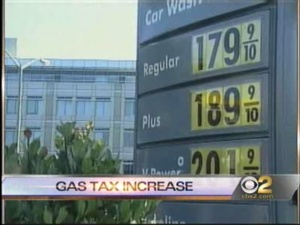Oh, and that pesky 'climate change'? Pay no attention to those litte ole sun spots. Oh, and with sunspot activity in remission pay no attention to the forecasts of cooler weather. (Maybe that's why they focus calling it global climate change, and not global warming)
This certainly isn't surprising.
Congress won't be satisfied until they get nearly all our paychecks.
I guess then they can put all of us on the public handout roll and they can control everything that we do - or don't do for that matter.
Yep, you all wanted change - it's sure coming.
Motorists' habits spur call for tax increases
 By JOAN LOWY, Associated Press Writer Joan Lowy, Associated Press Writer – Fri Jan 2, 1:00 pm ET
By JOAN LOWY, Associated Press Writer Joan Lowy, Associated Press Writer – Fri Jan 2, 1:00 pm ETAP – In this Nov. 28, 2008 file photo, gas prices posted at a Shell gas station in Stockton, Calif. A 50 …
WASHINGTON – Motorists are driving less and buying less gasoline, which means fuel taxes aren't raising enough money to keep pace with the cost of road, bridge and transit programs.
A federal commission created by Congress to find a way to make up the growing revenue shortfall in the program that funds highway repairs and construction is talking about increasing federal gas and diesel taxes.
A roughly 50 percent increase in gasoline and diesel fuel taxes is being urged by the commission until the government devises another way for motorists to pay for using public roads.
The 15-member National Commission on Surface Transportation Infrastructure Financing is the second group in a year to call for increasing the current 18.4 cents a gallon federal tax on gasoline and the 24.4 cents a gallon tax on diesel. State fuel taxes vary from state to state.
In a report expected in late January, members of the infrastructure financing commission say they will urge Congress to raise the gas tax by 10 cents a gallon and the diesel tax by about 12 cents to 15 cents a gallon. At the same time, the commission will recommend tying the fuel tax rates to inflation.
The commission will also recommend that states raise their fuel taxes and make greater use of toll roads and fees for rush-hour driving.
Although the cost of gasoline has dropped dramatically in recent months, such tax increases could be politically treacherous for Democratic leaders in Congress. A gas tax hike was one of the reasons they lost control of the House and Senate in the 1994 elections. President-elect Barack Obama has expressed concern about raising fuel taxes in the current economic climate.
But commission members said the government must find more road and bridge building money somewhere.
"I'm not excited about a gas tax increase, but the reality is our current gas tax doesn't pay for upkeep of the system we have now," said Adrian Moore, vice president of the Reason Foundation, a libertarian think tank in Los Angeles, and a member of the highway revenue commission. "We can either let the roads go to hell or we can pay more."
The dilemma for Congress is that highway and transit programs are dependent for revenue on fuel taxes that are not sustainable. Many Americans are driving less and switching to more fuel-efficient cars and trucks, and a shift to new fuels and technologies like plug-in hybrid electric cars will further erode gasoline sales.
According to a draft of the financing commission's recommendations, the nation needs to move to a new system that taxes motorists according to how much they use roads. While details have not been worked out, such a system would mean equipping every car and truck with a device that uses global positioning satellites and transponders to record how many miles the vehicle has been driven, and perhaps the type of roads and time of day.
"Most if not all of the commissioners have a strong belief and commitment that we need a fundamental transformation of the current system," said commission chairman Robert Atkinson, president of the Information Technology and Innovation Foundation, a technology policy think tank in Washington.
A study by the Transportation Research Board of the National Academies estimated that the annual gap between revenues and the investment needed to improve highway and transit systems was about $105 billion in 2007, and will increase to $134 billion in 2017 under current trends.
Projected shortfalls in revenue led the National Surface Transportation Policy and Revenue Study Commission, in a report issued in January 2008, to call for an increase of as much as 40 cents a gallon in the gas tax, phased in over five years.
Charles Whittington, chairman of the American Trucking Associations, which supports a fuel tax increase as long as the money goes to highway projects, said Congress may decide to disguise a fuel tax hike as a surcharge to combat climate change.
Transportation is responsible for about a third of all U.S. carbon emissions created by burning fossil fuels. Traffic congestion wastes an estimated 2.9 billion gallons of fuel a year. Less congestion would reduce greenhouse gases and dependence on foreign oil.
"Instead of calling it a gas tax, call it a carbon tax," Whittington said.
Bottlenecks around the nation cost the trucking industry about 243 million lost truck hours and about $7.8 billion per year, according to the commission.
___
On the Net:
http://financecommission.dot.gov/index.htm










No comments:
Post a Comment